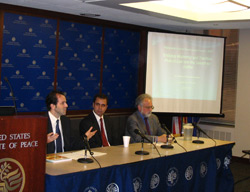Bridging Modernity and Tradition: Rule of Law and the Search for Justice in Afghanistan
--J Alexander Thier

Panelists at the event.
In war-ravaged Afghanistan, rebuilding the justice system to bridge modern and traditional justice institutions, protecting citizens’ rights and strengthening the rule of law are pivotal steps in the country’s march toward successful political transition and development.
The United States Institute of Peace and United Nations Development Program (UNDP) recently sponsored a discussion of these critical issues on the occasion of the publication of a new report, "Bridging Modernity and Tradition: Rule of Law and the Search for Justice," the UNDP’s 2007 Afghanistan Human Development Report. This report explores how justice and rule of law can be bolstered in Afghanistan, and takes stock of the country’s well-being using the human development index that measures education, health and economic prosperity; it then provides practical strategies for helping the country progress toward its development goals.
The speakers today delved deeply into important but relatively unchartered territory—how the Afghans and their international partners can combine the best elements of the formal and informal justice systems. This is an effort that has been central to USIP's work in Afghanistan for years, and this new report will considerably advance our cause.
Speakers
- Ali Wardak
Center for Policy and Human Development, Kabul University and lead author of the report - Dr. Barnett Rubin
Director of Studies and Senior Fellow, Center on International Cooperation, New York University - J Alexander Thier, Moderator
Senior Rule of Law Advisor, U.S. Institute of Peace
Archived Audio
To listen to audio or to view video, please click on the links provided below. You also can right click on the links and choose "Save Target As" or "Download Linked File." This will save the file to your computer and then allow you to play it in your media player directly. More Audio Help.
- Listen to the audio from this event.
1:24:41 - 15.5MB



